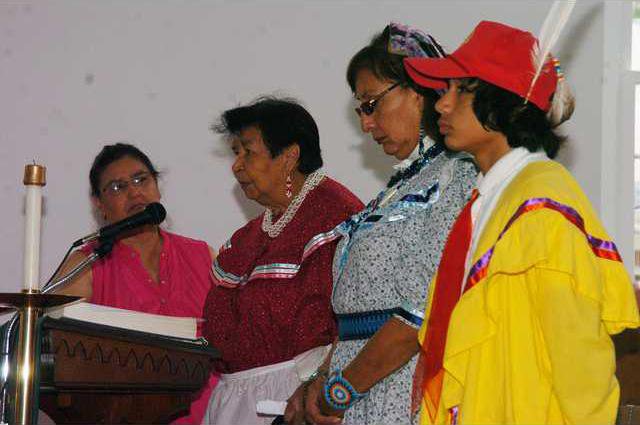The annual Salzburger Heritage Day opened its arms to its neighbors from the earliest days of the Ebenezer settlement.
The Euchee tribe, which was relocated to Oklahoma in the 1800s, was invited as special guests to the Labor Day event. The Euchees, originally
from Tennessee, migrated to South Carolina and Georgia and called the Coastal Empire and Lowcountry home.
Ann Holder, an elder of the Euchee tribe, said her people and the Salzburgers have much in common, besides a common land.
“It is my understanding the Salzburgers left their home country in persecution, seeking to worship the way they wanted,” she said. “Our people were driven west because our lands were wanted by the white settlers that were moving here. But it was under persecution that we left.”
Holder greeted the gathered Salzburger descendants at the Jerusalem Lutheran Church in the Euchee language. There is no word for hello, so she said good morning.
It’s also a language that is on the verge of dying out, she said.
“Ours is a unique language,” she said. “Linguists have tried to tie it to other languages and can’t seem to find any other language to tie it to.”
As a child, Holder spoke Euchee fluently. But when she was sent away to school, she was forbidden from conversing in the native tongue. She is being the taught the language again by younger Euchees.
“We almost lost our language,” she said. “I am now relearning it.”
Holder said they also were happy to be back walking on the land where her ancestors once lived. Several of the Euchees went back to the area around Charleston, S.C., before coming to Ebenezer for the Salzburger Heritage Day festivities.
“We still consider it sacred land,” she said.
Holder also said she hopes the fellowship between her people and the Salzburger descendants can continue to grow.
“There is so much in my heart it is hard to express,” she said. “But I think you understand.”
The Euchees also were part of the topic for the annual poster contest, which had the theme of “The Euchees and their relationship with the Salzburgers at Ebenezer” as its topic.
Two genealogists also were on hand Monday to help Salzburgers retrace their roots where their ancestors’ settlement grew.
“It’s a great place for me to see all this,” said Kenneth Thomas Jr. “To pull all this together is extremely important for us genealogists.”
Terry Barton, a genetic genealogist, said he was impressed with what the Georgia Salzburger Society had done and with its museum. Barton told the GSS members that they were living one part of understanding their ancestors and they were by being at Ebenezer. Another part is collecting the genealogy information.
“I am tremendously impressed with what you have done with this organization and this special center,” he said. ‘You should be very proud.”
Most Salzburgers were salt miners, but the ones who settled at Ebenezer were cattlemen, Georgia Salzburger Society vice president Vince Exley said. To that end, Jon Burns brought along a Pinzgauer cow, which originated in the Pinzgau region of Salzburg in Austria.
Exley remembered the time when Effingham was “an open range,” as cattle roamed freely, even across Highway 21.
“You had to be careful because a cow wouldn’t get off the road,” he said. “You blow the horn and a dog will go; blow hard at the cow, and the cow stands there and looks at you.”





